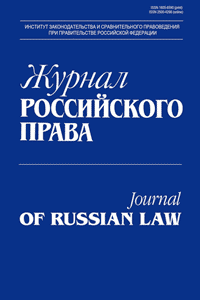Russian Federation
The article expresses the views on the controversial attitudes relating to the interpretation of law at different stages of development of science in general and legal science in particular. Tracing the respective changes, the author comes to the conclusion that classics was based on the rule of law; art Nouveau was aimed to destroy the rule of law; postmodern — on departure from reality. In the postmodern world-both legislator, and his will — are all the essence of fiction. Classical science was concerned to establish the objective truth; modernism believes all truth is relative; the postmodern — denies the establishment of the truth. The author suggests the answer to the question as to where the perspectives of the science lie should be sought in the realm of conjunction of natural and humanitarian sciences. And in the context of such cognitive-information theory the author draws the attention to importance of modern scientific trend-memetics and the use thereof in the field of jurisprudence. As a subtype of memetics the author suggests to introduce the notion of lawmemetics to be employed to study the two types of the mems: the entity of legal reality and the entity of psychological reality. The substantial aspect memetics is called to be the resumption and poliform-like repetition of what was originally coded as the mem information and was designed to secure its values as applied to the new circumstances of place and time.
ascertainment of law, explanation of law, cognition of law, methodology, paradigms classical and postclassical science, information exchanges, memetics.
1. Henke Ch. Memetik und Recht. HFR 2/2007.
2. Wegener F. Memetik. Der Krieg des neuen Replikators gegen den Menschen. Gladbeck, KFVR, 3. Auflage 2015.
3. Antonov M. V. Sovremennaya teoriya prava vo Frantsii: realisticheskiy podkhod k pravu v kontseptsii Mishelya Tropera i spor o neorealizme v tolkovanii. Rossiyskiy ezhegodnik teorii prava. 2011. № 4.
4. Bayteeva M. V. Problemy ponimaniya prava s pozitsiy fenomenologicheskoy germenevtiki. Rossiyskiy ezhegodnik teorii prava. 2011. № 4.
5. Vas´kovskiy E. V. Izbrannye raboty pol´skogo perioda. M., 2016.
6. Zavadskiy A. V. K ucheniyu o tolkovanii grazhdanskikh zakonov. Noveyshie techeniya po etomu voprosu v nemetskoy literature (shkola svobodnogo prava i dr.) / pod red. i s predisl. A. Simolina. Kazan´, 1916.
7. Iglton T. Pochemu Marks byl prav. Per. s angl. M., 2012.
8. Maykhofer V. Pravo i bytie. Prolegomeny k ontologii prava. Rossiyskiy ezhegodnik teorii prava. 2008. № 1.
9. Medushevskiy A. Kognitivnaya teoriya prava i yuridicheskoe konstruirovanie real´nosti. Sravnitel´noe konstitutsionnoe obozrenie. 2011. № 5.
10. Pfersmann O. Protiv yuridicheskogo neorealizma. Po povodu spora o tolkovanii. Rossiyskiy ezhegodnik teorii prava. 2011. № 4.
11. Syrykh V. M. Materialisticheskaya teoriya prava: v 3 t. M., 2011.
12. Syrykh V. M. Materialisticheskaya filosofiya publichnogo prava: monografiya. M., 2016.
13. Troper M. Svoboda tolkovaniya u konstitutsionnogo sud´i. Rossiyskiy ezhegodnik teorii prava. 2011. № 4.
14. Chestnov I. L. Pominki po postmodernizmu, ili Zdravstvuy, postklassika?. Rossiyskiy ezhegodnik teorii prava. 2011. № 4.
15. Chestnov I. L. Postklassicheskoe pravoponimanie: monografiya. Krasnodar, 2010.
16. Yarkova E. N. Istoriya i metodologiya yuridicheskoy nauki: ucheb. posobie. Tyumen´, 2012.








